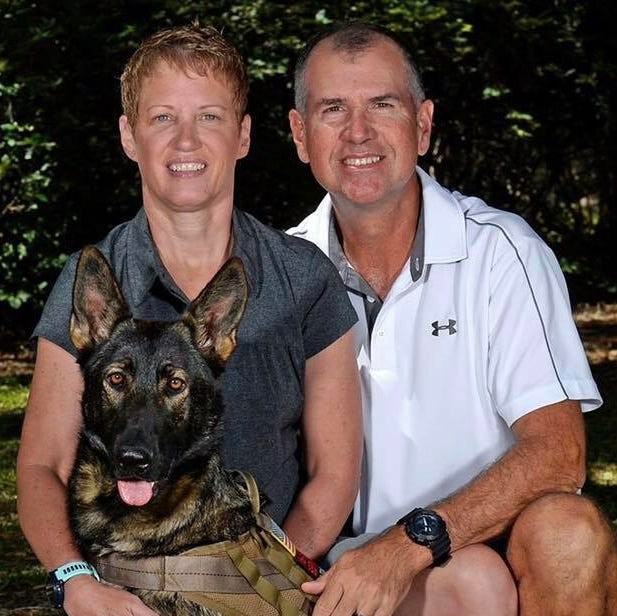For Army veteran Natalie Vines who has TBI and PTSD, asking for help is crucial. She didn't always do so and she now realizes that was a mistake. Relying on her support group, having at least five phone numbers of other vets who can help in her phone, and knowing how best to deal with her stress like taking a walk, playing catch with her service dog, reading a book, or listening to music are all strategies that work for her.
Her husband and fulltime caregiver, Brian Vines, also says that finding programs like Wounded Warrior Project that are a good fit is essential for moving forward.
Shortly after Brian and Natalie Vines met in the military in 1998, their unit deployed to Kuwait. Fueled by assignments on nearby bases, common interests, and shared military experiences, their friendship grew into a romantic relationship that eventually led them to the alter. Brian and Natalie loved their careers in the U.S. Army — Brian served for 28 years and Natalie for 21. After several sustaining several TBIs and living with PTSD, Natalie retired from the Army.
And in 2012, Brian, who lives with PTSD as well, decided to retire to take care of his wife. Since then, both Brian and Natalie also found significant growth and healing through their participation in the WWP Independence Program. Brian volunteers as a peer mentor helping his fellow veterans on WWP Project Odyssey® events.
For information about treatments for TBI and PTSD, please visit The Treatment Hub.
Don’t stop asking for help. That’s the main thing. I made that mistake. Asking for help. That’s the main thing. Reaching out to other veterans.
Get your support group. A support group is very important. I didn’t have that at first, but you’ve got to have that. You got to have that five numbers, at least five numbers in your phone book that you can call, and you know they’re going to be there. Don't ever stop - that’s the main thing.
You got to have a way of dealing with the stress. And I’ve always had this coping card of the things that work for me. Taking my service dog out, playing ball with him, putting my headphones on, reading a book, watching TV, taking a walk, riding a bicycle, going on a drive, getting out, calling a buddy. You’ve got to have those systems in place.
Ask for help and call someone. Use all your resources such as the Wounded Warrior Project resource line. There are a lot of good programs out there to help with TBI and PTSD.
And really the best communications form is through other veterans and finding out what they’ve gone through. And then be open to the ideas of that particular organization and how they treat PTSD and TBI. Some tend to focus more on PTSD; others may focus more on TBI; or you may find a hybrid type treatment plan.
But make sure you find the one that fits you and your comfort level, and you always come out better than when you started.
BrainLine is powered in part by Wounded Warrior Project to honor and empower post-9/11 injured service members, veterans, and their families.
About the author: Brian and Natalie Vines
Shortly after Brian and Natalie Vines met in the military in 1998, their unit deployed to Kuwait. Fueled by assignments on nearby bases, common interests, and shared military experiences, their friendship grew into a romantic relationship that eventually led them to the alter. Brian and Natalie loved their careers in the U.S. Army — Brian served for 28 years and Natalie for 21. After several sustaining several TBIs and living with PTSD, Natalie retired from the Army. And in 2012, Brian, who lives with PTSD as well, decided to retire to take care of his wife. Since then, both Brian and Natalie also found significant growth and healing through their participation in the Wounded Warrior Project® Independence Program. Brian volunteers as a peer mentor helping his fellow veterans on WWP Project Odyssey® events.

